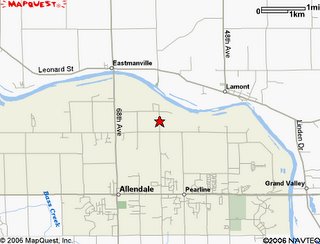Prairie Home Cemetery

He drove. A mild summer day a few years ago. The trees were blazing green, resplendent, full and so bushy you'd think they were on Rogaine. Those little helicopter seeds floated from the sky the whole length of the road he was traveling, lodging themselves in the recessed space where the windshield wipers lived. A slow grade up, then over the crest and shoooom down a steep hill; even in his late twenties his inner kid liked that moment of stomachy goodness.
He turned left, drove in a ways, parked, shut off the engine, windows down, radio on: Prairie Home Companion. Allendale Cemetery. A patch of trees, some possibly 150 years old, surrounded by fields exploding with corn stalks on all sides, the inevitable urban sprawl not quite this far up the road yet, though not too far away were McMansions built centered on two-acre plots. Farm Killing Domiciles. There was a sign directly across the street advertising Chatham Estates, with an optimistic diagram of lots and culs-de-sac. Someone had spray-painted a big message across it: GO AWAY STOP BILDING FUKERS. The scribe had his heart in the right place, he mused, but the text needed some fine tuning. He bet it was some local farm kid who saw what was happening to the town, saw the defeat and stress in his parents' eyes, and wanted to do something about it, to strike back. But he could only flail, impotently, against the insectile mindless buzz of change. There would be a new sign, then a paved drive surrounded by dozed dirt, then a row of ugly houses, no porches, two stall garages pushed out front, each built into a false hill with a walkout basement and flooding problems.
He finished his fast food burger and got out of the car, stretching his muscles, sneezing suddenly from the late afternoon sunshine. Three rows forward. Seven plots down. Here were his great-grandparents, his father's mother's folks. They farmed in the Depression, coaxing grain from the parched dirt, keeping as many cows, pigs and chickens as he could, using their seven children as labor because that was what you did. One daughter died of tuberculosis; one son lost a leg in the war. But despair doesn't buy food, so they got on with life without pause or undue reflection. Times got a little better, and John put up his nest egg to buy into a fledgling telephone company, subsidized through the Rural Electrification Act. It was a success. But Minnie died, age 38. He lived till 90, outliving four of his children. Today, in the cemetery, sitting cross-legged on the grass before them, he could think of few things more gut-wrenching than burying your wife or children. How does anyone dare get married, or procreate, when such horrible things are possible? He tipped his imaginary hat in respect, tossed his fast-food bag in the trash, and walked back to his car. Life in America may be more complex now, but don't let anyone tell you it's harder.

